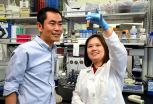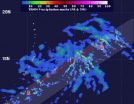(Press-News.org) When it comes to using marijuana, new research, involving mice and published in the October 2014 issue of the Journal of Leukocyte Biology, suggests that just because you can do it, doesn't mean that you should. That's because a team of Italian scientists have found that using marijuana in adolescence may do serious long-term damage to the immune system. This damage may result in autoimmune diseases and chronic inflammatory diseases, such as multiple sclerosis, inflammatory bowel disease and rheumatoid arthritis in adulthood.
"I hope that the knowledge that early exposure to marijuana is associated with immediate and long-term deleterious effects on the immune system may reach adolescents and their families," said Paola Sacerdote, Ph.D., a researcher involved in the work from the Università degli Studi di Milano in Milano, Italy. "The increased risk of getting sick in adulthood may hopefully be a deterrent for marijuana abuse among young individuals."
To make this discovery, scientists injected "adolescent" mice with THC, the main active component of marijuana, for 10 days. This period in the mouse lifecycle corresponded to the adolescence period in humans (approximately ages 12-18). A second group of adolescent mice received only a placebo. At the end of treatments, both groups of animals were left undisturbed for approximately two months, until they reached full adulthood. The activity of the immune system was then evaluated, taking into consideration several important measurements, such as the ability of leukocytes to produce cytokines to mount an antibody response to vaccination or the capacity of macrophage to phagocyte particles. The group of mice treated with THC in adolescence had severe alterations of immune responses in adulthood, characterized by a clear switch toward a pro-inflammatory and cytotoxic phenotype.
"The immune system is characterized by an impressive ability to 'remember' previous exposures and changes during the period of immune system development especially early in life can have important long-term consequences," said John Wherry, Ph.D., Deputy Editor of the Journal of Leukocyte Biology. "These studies not only point to adolescence as a key phase of immune system sensitivity, but also highly the dramatic and long-lasting negative effects that a common recreational drug abused by teenagers may have on immune function."
INFORMATION:
The Journal of Leukocyte Biology publishes peer-reviewed manuscripts on original investigations focusing on the cellular and molecular biology of leukocytes and on the origins, the developmental biology, biochemistry and functions of granulocytes, lymphocytes, mononuclear phagocytes and other cells involved in host defense and inflammation. The Journal of Leukocyte Biology is published by the Society for Leukocyte Biology.
Details: Sarah Moretti, Mara Castelli, Silvia Franchi, Maria Augusta Raggi, Laura Mercolini, Michele Protti, Lorenzo Somaini, Alberto E. Panerai, and Paola Sacerdote. Δ9-Tetrahydrocannabinol-induced anti-inflammatory responses in adolescent mice switch to proinflammatory in adulthood. J. Leukoc. Biol. jlb.3HI0713-406RR; doi:10.1189/jlb.3HI0713-406RR ; http://www.jleukbio.org/content/96/4/523.abstract
Adolescent exposure to thc may cause immune systems to go up in smoke
New research published in the Journal of Leukocyte Biology suggests that early exposure to marijuana can affect immune system development, leading to immune-related diseases in adulthood
2014-09-30
ELSE PRESS RELEASES FROM THIS DATE:
Cancer therapy: Driving cancer cells to suicide
2014-09-30
Researchers of Ludwig-Maximilians-Universitaet (LMU) in Munich report that a new class of chemical compounds makes cancer cells more sensitive to chemotherapeutic drugs. They have also pinpointed the relevant target enzyme, thus identifying a new target for anti-tumor agents.
Researchers led by LMU's Professor Angelika Vollmar and Professor Stephan Sieber of the Technische Universität München have identified a class of chemicals that represent a potential new weapon in the fight against malignant tumors. The compound is itself non-toxic, but it stimulates the killing ...
Scientists identify which genes are active in muscles of men and women
2014-09-30
If you want your doctor to know what goes wrong with your muscles because of age, disease or injury, it's a good idea to know what "normal" actually is. That's where a new research report published in the October 2014 issue of the FASEB Journal comes in. In the report, a team of scientists produce a complete transcriptome—a key set of molecules that can help scientists "see" which genes are active in an organ at a particular time. What's more, they found never-before-detected gene activity and that men have approximately 400 more active genes in their skeletal muscle than ...
Synthetic sperm protein raises the chance for successful in vitro fertilization
2014-09-30
Having trouble getting pregnant—even with IVF? Here's some hope: A new research report published in October 2014 issue of The FASEB Journal, explains how scientists developed a synthetic version of a sperm-originated protein known as PAWP, which induced embryo development in human and mouse eggs similar to the natural triggering of embryo development by the sperm cell during fertilization.
"We believe that the results of this study represent a major paradigm shift in our understanding of human fertilization by providing a precise answer to a fundamental unresolved scientific ...
Genetic test for cancer patients could be cost-effective and prevent further cases
2014-09-30
Screening for a genetic condition in younger people who are diagnosed with bowel cancer would be cost-effective for the NHS and prevent new cases in them and their relatives, new research has concluded.
Researchers at the University of Exeter Medical School were funded by the National Institute for Health Research Health Technology Assessment (NIHR HTA) Programme to assess the effectiveness and cost-effectiveness of screening for Lynch Syndrome. Their findings, published in Health Technology Assessment, indicate that screening the 1,700 people under the age of 50 who ...
Risky metabolism
2014-09-30
This news release is available in German.
Animals often differ in their behavioural response to risky situations such as exposure to predators. Researchers from the Max Planck Institute for Ornithology now found in a long-term study on different populations of great tits that risk-taking behaviour correlates with both metabolic rate and ambient temperature. High metabolic rates and low temperatures were associated with high risk-taking behaviour, as in these scenarios birds were more likely to approach potential predators.
The readiness to take a risk is to a ...
New blood test determines whether you have or are likely to get cancer
2014-09-30
A new research report published in the October 2014 issue of The FASEB Journal may make the early detection of cancer as easy as a simple blood test. This test, called the "lymphocyte genome sensitivity" (LGS) test, could not only detect some cancers earlier than ever before, but it may eliminate the need for some types of biopsies, as well as identify those more likely to develop cancer in the future.
"The test could allow earlier cancer detection, so helping to save peoples' lives," said Diana Anderson, a researcher involved in the work from the School of Life Sciences ...
Tropical Storm Rachel dwarfed by developing system 90E
2014-09-30
Tropical Storm Rachel is spinning down west of Mexico's Baja California, and another tropical low pressure area developing off the coast of southwestern Mexico dwarfs the tropical storm. NOAA's GOES-West satellite showed the size difference between the two tropical low pressure areas.
NOAA's GOES-West satellite captured an image of the Eastern Pacific Ocean on Sept. 30 at 1200 UTC (8 a.m. EDT). In the infrared image, Tropical Storm Rachel appeared small in comparison to the low pressure area called System 90E, coming together hundreds of miles south. As Rachel spins down ...
Virginia Tech researchers discover potential biomarker to detect 'bubble boy' disorder
2014-09-30
Many people recognize "the bubble boy" as an unusual character from a "Seinfeld" episode or a John Travolta movie.
But in reality, a genetic disease called SCID, short for severe combined immunodeficiency, forces patients to breathe filtered air and avoid human contact because their bodies' natural defenses are too weak to fight germs.
Although it affects fewer than 2,000 new births each year worldwide, SCID is a cousin to acquired immune deficiency syndrome triggered by a human immunodeficiency virus — HIV/AIDS.
Now, using a mouse model, Virginia Tech researchers ...
NASA's TRMM satellite sees Tropical Storm Phanfone fragmented
2014-09-30
The bands of thunderstorms wrapping around Tropical Storm Phanfone in the Northwestern Pacific Ocean appeared fragmented to NASA's TRMM satellite.
On Sept. 30, a typhoon watch remains in effect for the far northern Marianas Islands including Pagan and Alamagan. Tropical storm warnings have been cancelled for Tinian and Saipan, but remain in effect for Pagan, Alamagan and surrounding waters. A flash flood watch remains in effect for the island of Saipan. For updated forecasts for these islands, visit the U.S. National Weather Service Office's Guam website: http://www.prh.noaa.gov/guam/cyclone.php.
On ...
A heartbeat away? Hybrid 'patch' could replace transplants
2014-09-30
Because heart cells cannot multiply and cardiac muscles contain few stem cells, heart tissue is unable to repair itself after a heart attack. Now Tel Aviv University researchers are literally setting a new gold standard in cardiac tissue engineering.
Dr. Tal Dvir and his graduate student Michal Shevach of TAU's Department of Biotechnology, Department of Materials Science and Engineering, and Center for Nanoscience and Nanotechnology, have been developing sophisticated micro- and nanotechnological tools — ranging in size from one millionth to one billionth of a meter — ...
LAST 30 PRESS RELEASES:
Personalised “cocktails” of antibiotics, probiotics and prebiotics hold great promise in treating a common form of irritable bowel syndrome, pilot study finds
Experts developing immune-enhancing therapies to target tuberculosis
Making transfusion-transmitted malaria in Europe a thing of the past
Experts developing way to harness Nobel Prize winning CRISPR technology to deal with antimicrobial resistance (AMR)
CRISPR is promising to tackle antimicrobial resistance, but remember bacteria can fight back
Ancient Maya blessed their ballcourts
Curran named Fellow of SAE, ASME
Computer scientists unveil novel attacks on cybersecurity
Florida International University graduate student selected for inaugural IDEA2 public policy fellowship
Gene linked to epilepsy, autism decoded in new study
OHSU study finds big jump in addiction treatment at community health clinics
Location, location, location
Getting dynamic information from static snapshots
Food insecurity is significant among inhabitants of the region affected by the Belo Monte dam in Brazil
The Society of Thoracic Surgeons launches new valve surgery risk calculators
Component of keto diet plus immunotherapy may reduce prostate cancer
New circuit boards can be repeatedly recycled
Blood test finds knee osteoarthritis up to eight years before it appears on x-rays
April research news from the Ecological Society of America
Antimicrobial resistance crisis: “Antibiotics are not magic bullets”
Florida dolphin found with highly pathogenic avian flu: Report
Barcodes expand range of high-resolution sensor
DOE Under Secretary for Science and Innovation visits Jefferson Lab
Research expo highlights student and faculty creativity
Imaging technique shows new details of peptide structures
MD Anderson and RUSH unveil RUSH MD Anderson Cancer Center
Tomography-based digital twins of Nd-Fe-b magnets
People with rare longevity mutation may also be protected from cardiovascular disease
Mobile device location data is already used by private companies, so why not for studying human-wildlife interactions, scientists ask
Test reveals mice think like babies
[Press-News.org] Adolescent exposure to thc may cause immune systems to go up in smokeNew research published in the Journal of Leukocyte Biology suggests that early exposure to marijuana can affect immune system development, leading to immune-related diseases in adulthood



